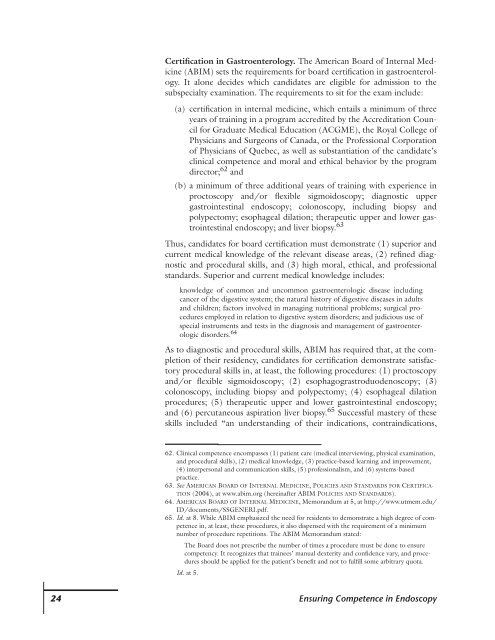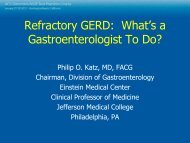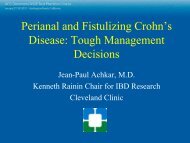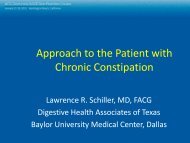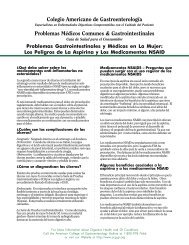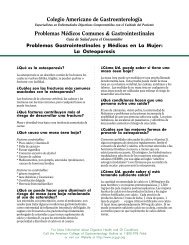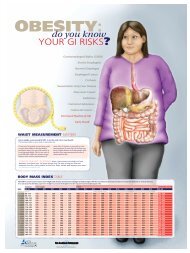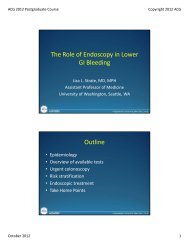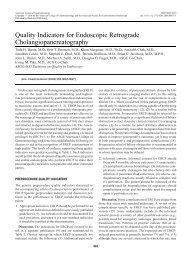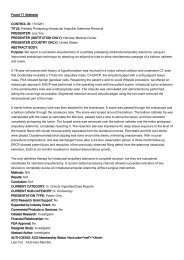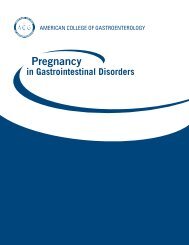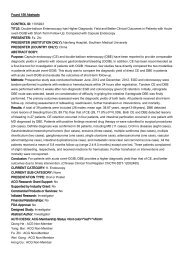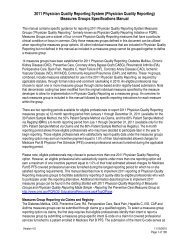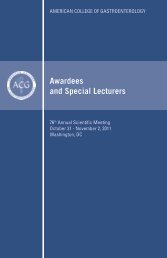Ensuring Competence in Endoscopy - American College of ...
Ensuring Competence in Endoscopy - American College of ...
Ensuring Competence in Endoscopy - American College of ...
Create successful ePaper yourself
Turn your PDF publications into a flip-book with our unique Google optimized e-Paper software.
Certification <strong>in</strong> Gastroenterology. The <strong>American</strong> Board <strong>of</strong> Internal Medic<strong>in</strong>e<br />
(ABIM) sets the requirements for board certification <strong>in</strong> gastroenterology.<br />
It alone decides which candidates are eligible for admission to the<br />
subspecialty exam<strong>in</strong>ation. The requirements to sit for the exam <strong>in</strong>clude:<br />
(a) certification <strong>in</strong> <strong>in</strong>ternal medic<strong>in</strong>e, which entails a m<strong>in</strong>imum <strong>of</strong> three<br />
years <strong>of</strong> tra<strong>in</strong><strong>in</strong>g <strong>in</strong> a program accredited by the Accreditation Council<br />
for Graduate Medical Education (ACGME), the Royal <strong>College</strong> <strong>of</strong><br />
Physicians and Surgeons <strong>of</strong> Canada, or the Pr<strong>of</strong>essional Corporation<br />
<strong>of</strong> Physicians <strong>of</strong> Quebec, as well as substantiation <strong>of</strong> the candidate’s<br />
cl<strong>in</strong>ical competence and moral and ethical behavior by the program<br />
director; 62 and<br />
(b) a m<strong>in</strong>imum <strong>of</strong> three additional years <strong>of</strong> tra<strong>in</strong><strong>in</strong>g with experience <strong>in</strong><br />
proctoscopy and/or flexible sigmoidoscopy; diagnostic upper<br />
gastro<strong>in</strong>test<strong>in</strong>al endoscopy; colonoscopy, <strong>in</strong>clud<strong>in</strong>g biopsy and<br />
polypectomy; esophageal dilation; therapeutic upper and lower gastro<strong>in</strong>test<strong>in</strong>al<br />
endoscopy; and liver biopsy. 63<br />
Thus, candidates for board certification must demonstrate (1) superior and<br />
current medical knowledge <strong>of</strong> the relevant disease areas, (2) ref<strong>in</strong>ed diagnostic<br />
and procedural skills, and (3) high moral, ethical, and pr<strong>of</strong>essional<br />
standards. Superior and current medical knowledge <strong>in</strong>cludes:<br />
knowledge <strong>of</strong> common and uncommon gastroenterologic disease <strong>in</strong>clud<strong>in</strong>g<br />
cancer <strong>of</strong> the digestive system; the natural history <strong>of</strong> digestive diseases <strong>in</strong> adults<br />
and children; factors <strong>in</strong>volved <strong>in</strong> manag<strong>in</strong>g nutritional problems; surgical procedures<br />
employed <strong>in</strong> relation to digestive system disorders; and judicious use <strong>of</strong><br />
special <strong>in</strong>struments and tests <strong>in</strong> the diagnosis and management <strong>of</strong> gastroenterologic<br />
disorders. 64<br />
As to diagnostic and procedural skills, ABIM has required that, at the completion<br />
<strong>of</strong> their residency, candidates for certification demonstrate satisfactory<br />
procedural skills <strong>in</strong>, at least, the follow<strong>in</strong>g procedures: (1) proctoscopy<br />
and/or flexible sigmoidoscopy; (2) esophagograstroduodenoscopy; (3)<br />
colonoscopy, <strong>in</strong>clud<strong>in</strong>g biopsy and polypectomy; (4) esophageal dilation<br />
procedures; (5) therapeutic upper and lower gastro<strong>in</strong>test<strong>in</strong>al endoscopy;<br />
and (6) percutaneous aspiration liver biopsy. 65 Successful mastery <strong>of</strong> these<br />
skills <strong>in</strong>cluded “an understand<strong>in</strong>g <strong>of</strong> their <strong>in</strong>dications, contra<strong>in</strong>dications,<br />
62. Cl<strong>in</strong>ical competence encompasses (1) patient care (medical <strong>in</strong>terview<strong>in</strong>g, physical exam<strong>in</strong>ation,<br />
and procedural skills), (2) medical knowledge, (3) practice-based learn<strong>in</strong>g and improvement,<br />
(4) <strong>in</strong>terpersonal and communication skills, (5) pr<strong>of</strong>essionalism, and (6) systems-based<br />
practice.<br />
63. See AMERICAN BOARD OF INTERNAL MEDICINE, POLICIES AND STANDARDS FOR CERTIFICA-<br />
TION (2004), at www.abim.org (here<strong>in</strong>after ABIM POLICIES AND STANDARDS).<br />
64. AMERICAN BOARD OF INTERNAL MEDICINE, Memorandum at 5, at http://www.utmem.edu/<br />
ID/documents/SSGENERI.pdf.<br />
65. Id. at 8. While ABIM emphasized the need for residents to demonstrate a high degree <strong>of</strong> competence<br />
<strong>in</strong>, at least, these procedures, it also dispensed with the requirement <strong>of</strong> a m<strong>in</strong>imum<br />
number <strong>of</strong> procedure repetitions. The ABIM Memorandum stated:<br />
The Board does not prescribe the number <strong>of</strong> times a procedure must be done to ensure<br />
competency. It recognizes that tra<strong>in</strong>ees’ manual dexterity and confidence vary, and procedures<br />
should be applied for the patient’s benefit and not to fulfill some arbitrary quota.<br />
Id. at 5.<br />
24 <strong>Ensur<strong>in</strong>g</strong> <strong>Competence</strong> <strong>in</strong> <strong>Endoscopy</strong>


